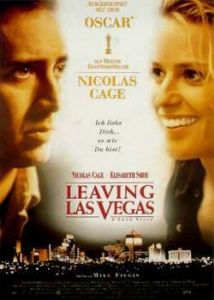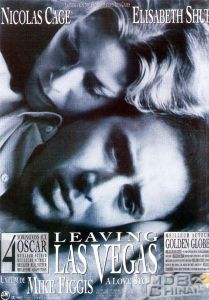Leaving Las Vegas (1995)离开拉斯维加斯
After this wonderful film,most of Nicolas Cage's fans all are regrettable that he chose commercial films,if you feel uncomfortable about this,so i think you dont know much about Hollywood's rules yet,we dont need feel regrettable about Cage,because he made such a wonderful film for us at least.Nicolas Cage received an Academy Award for Best Actor for his work in this film.Elisabeth Shue was nominated for the Academy Award for Best Actress and the film also received nominations for Best Adapted Screenplay and Best Director (Figgis).
Leaving Las Vegas is a 1995 romantic drama film about a relationship between a suicidal alcoholic and a prostitute in Las Vegas, starring Nicolas Cage and Elisabeth Shue. Ben Sanderson is a Los Angeles screenwriter whose alcoholism costs him his career and family. Terminating all personal and professional ties to his L.A. existence, he drives off to Las Vegas, where alcohol is available from many sources at all hours, to drink himself to death. There he meets Sera, a pretty but hardened prostitute. The film was directed and written by Mike Figgis, based on a semi-autobiographical novel by John O'Brien. Two weeks after the production of the film had started, O'Brien committed suicide. A halt of the project was considered, but work on the film was continued as a tribute to the author.
Directed by Mike Figgis
Produced by Lila Cazès
Annie Stewart
Written by John O'Brien (novel)
Mike Figgis (screenplay)
Starring Nicolas Cage
Elisabeth Shue
Julian Sands
Richard Lewis
Valeria Golino
Music by Mike Figgis
Aspect Ratio 1.85 : 1
Cinematography Declan Quinn
Editing by John Smith
Distributed by United Artists
Genre Drama,Romance
Release date(s) October 27, 1995 (limited)
February 9, 1996 (wide)
Running time 112 min.
Country United States
Language English
Budget $4,000,000 (estimated)
Gross revenue $32,029,928
Plot Keywords Prostitute,Death,Sex,Bar,Alcoholic
Parents Guide View content advisory for parents
MPAA Rated R for strong sexuality and language,violence and pervasive alcohol abuse.
With LEAVING LAS VEGAS, director Mike Figgis spun critical gold out of what would appear to be a maudlin and hackneyed premise--a down-and-out drunk meets a hooker with a heart of gold. The reason for the film's success lies partly in its refusal to moralize, but mostly it is the strong performances of Nicholas Cage and Elisabeth Shue that make the story believable and poignant. Ben Sanderson (Cage) is a Hollywood screenwriter who has become an alcoholic. After being fired, he takes his severance pay to Las Vegas, where he plans to drink himself to death. There he meets Sera (Shue), a streetwise prostitute who responds both to Ben's wild antics and to his absolute gentleness. What Sera needs most is to be needed, and Ben needs her a lot. Figgis uses his whole bag of tricks--Sera talks to the camera, the exteriors are shot in grainy 16mm--but finally it is the perfectly-conceived relationship between these two wounded people that drew the rave reviews. The film was based on a novel by John O'Brien.
Academy Award for Best Actor: (Nicolas Cage)
Golden Globe Award for Best Actor - Motion Picture Drama: (Nicolas Cage)
Academy Award for Best Actress: (Elisabeth Shue)
Academy Award for Directing: (Mike Figgis)
Academy Award for Writing Adapted Screenplay: (Mike Figgis)
Golden Globe Award for Best Director - Motion Picture: (Mike Figgis)
Golden Globe Award for Best Motion Picture - Drama: (Leaving Las Vegas)
Golden Globe Award for Best Actress - Motion Picture Drama: (Elisabeth Shue)
(1)Author: Andy (film-critic) from Bookseller of the Blue Ridge
To me, this is one of the best romantic films that you can get your hands on. If you are interested in seeing a pure love, one that is not focused purely on sex, but instead emotional and mental connectiveness, then this is the film for you. While others will argue that this is not the best date film, I would beg to differ. Leaving Las Vegas would be a perfect choice for a first date film over anything that Meg Ryan or the recycle bin of Hollywood has to offer. It is a gripping story of realistic love, and the dramatic consequences of giving your heart to someone. It is about dreams, companionship, and the hurdles of everyday romance. This is a film that proves that the darker underbelly of our society still has a shimmering light of hope and love. Director Mike Figgis has done an outstanding job of giving these two rich characters the right elements to build upon the "classic" love-story moments, while giving it a flavor uniquely his own. Figgis' mixture of gritty Vegas with the beautiful jazz sounds really created the ambiance of love and pushed these two ugly ducklings closer towards their transformation into love. I think that is what really captured me on this film, was that it was similar to the love stories that Hollywood continually releases, except it gave us two tragic characters instead of these bubbly, money isn't everything, characters that seem to be repetitive cogs in the Hollywood machine.
Let me explain this further. When you think of a love story, what are the elements that you consider? You have a guy and a girl (normally), they have this coincidental moment where they find their common bond, they are held back by either an internal or external dilemma, there is a factor of insecurity, and finally the dramatic ending where the two rush together at a predisclosed location (normally an airport). Does that sound familiar in any way? These are all elements that you can find in LLV. I have seen this film at least a dozen times, and for some odd reason it was this viewing that it just seemed to click for me. This is the perfect American love story told with a darker tone. While most will see this as nothing more than the story of a drunk trying to kill himself and a graphic scenes with a prostitute, I saw it as the classic story of love. All the elements are present. Ben and Sera coincidentally meet one night, both seeking companionship and without the pressures of sex, they immediately form this bond that will never be broken. Through Ben's drunkenness, he remembers her and continually wants to see her. They both have internal factors that hold them back, Sera's is prostitution while Ben's is his drinking. Even through there are these factors, they still find themselves together. That feeling of insecurity is even there when Sera arrives home one night to find Ben with someone else. It all seems to fit. Then there is the amazing ending that will either have you in rapture or in awe. These two are in love, and it isn't this bubbly love between Tom Hanks and Meg Ryan, it is truths of America finding the dream of compassion.
The only unnecessary moments that I felt could have been fine-tuned were those involving Julian Sans. I just couldn't capture his character. I needed a bit more back-story or perhaps more interactions between him and Sera. Something was missing that distracted from the scenes that they shared. Outside of this one element, the rest of the film was purely flawless and even at times carnal. For example, when Sera has the opportunity to be on her own, she chooses to forgo her independence and be with Ben. Shue and Figgis both demonstrate that perhaps Sera is not in love with Ben, but instead the concept of a man wanting to be with her because of who she is. It is obvious that Sera seeks companionship, and probably has never had it all her life, when suddenly Ben struts into the picture. This may explain why she continues to work when she doesn't have to. She is used to the job, she thrives for the intensity, and perhaps uses it to fall deeper in love with Ben. Figgis doesn't come out and give you a reason why Sera continues along her path, but instead leaves it up to your imagination and enjoyment. Leaving Las Vegas felt like a combination Breaking the Waves, Love Liza, and All the Real Girls. This is a love story with so many different human elements coming to you at once that the average viewer would probably ignore the signs and see this as a depressing film. While it isn't the lightest film of the ages, it does prove that "Love is a very splendid thing".
I cannot end this review without at least mentioning the amazing acting done by both Nicolas Cage and Elizabeth Shue. The chemistry between them is rare in Hollywood. I felt that these two really made this film and were just not placed in their roles to sell tickets. Cage really felt comfortable and understood his character while Shue fit perfectly with her secrets and heart. It is obvious why Cage won the Oscar for his role in this film, and while I am sure we will never see him take a role like this again (thanks to summer blockbusters), it was good to see him take a role that really redefined the romance genre. The same goes for Shue. While she hasn't really made another film like this one in a very long time (outside of Adventures in Babysitting), it is good to know that she can take on roles like this and have the guts to follow through.
Overall, this was a very powerful and emotional film for me. (over)
(2)Author: mstomaso from Vulcan
If Mike Figgis never made another film, and Nick Cage and Elizabeth Shue retired after making Leaving Las Vegas, they would have done so with impunity. Both actors are superb, and bring the excellent screenplay to life with the help of some masterful dramatic cinematography.
Cage plays a suicidal alcoholic who has come to Las Vegas to drink himself to death, and Shue plays the unexpected problem - a prostitute who falls in love with him. The only reason this film did not receive a ten from me is the voice-over technique which was tastefully minimal, but, in my opinion, the only mistake the director made. It does help to provide closure, but I felt that closure was an unnecessary compromise here.
This is not an entertaining film, and in truth, I am surprised by its popularity among typical audiences. It is a serious film, and a work of art, but fun is not to be found here. DO NOT see this film if you dislike feeling emotionally drained and ethically challenged, and DO NOT see it if you are very prone to boredom, or easily offended by sexual violence, substance abuse and the horror of daily life on the street.
This is an intensely sad film about love shared by people who are caught in the gravity of their lives and can not escape. It is also a story of redemption and respect, found in improbable places. It is NOT a fun-filled frolicking romantic comedy, but rather, the opposite, and it achieves a beauty, dignity and power almost unique among films treating such starkly real and disturbing subjects.
http://en.wikipedia.org/wiki/Leaving_Las_Vegas
http://www.imdb.com/title/tt0113627/
http://www.rottentomatoes.com/
附件列表
词条内容仅供参考,如果您需要解决具体问题
(尤其在法律、医学等领域),建议您咨询相关领域专业人士。


